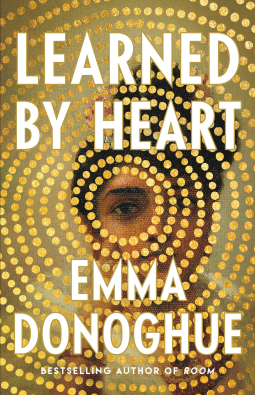- Book Reviews THE ASTRAL LIBRARY by Kate Quinn
- Book Reviews THE HARD LINE, A Gray Man Novel (Gray Man series, Book 15) by Mark Greaney
- Children's Book Reviews THE NUTCRACKER by E.T.A. Hoffman
- Children's Book Reviews RANGE: HOW EXPLORING YOUR INTEREST CAN CHANGE THE WORLD by David Epstein
- Children's Book Reviews CHICKA CHICKA BOOKS: I LOVE DAD AND TRICKA TREATA
- Book Reviews FAMILY DRAMA by Rebecca Fallon
- Book Reviews WORSE THAN A LIE by Ben Crump
- Book Reviews THE LAST OF EARTH by Deepa Anappara
- Book Reviews THREE HITMEN A BABY by Rob Hart
- Book Reviews ARTIFACTS by Natalie Lemle

LEARNED BY HEART by Emma Donahue
5 stars
In this compelling, meticulously researched, latest historical fiction, Emma Donahue turns her sharp focus to the plight of women in the early 1800’s Britain. The scene opens in 1805 at a “finishing” boarding school in York for girls – mainly focused on getting them out of their dismissive parents’ homes and teaching them the manners, arts and skills that will make them attractive future wives.
There’s Eliza Raine, a 14-year old orphan of a British doctor and unofficial “country wife” in India, who gets sent from Madras India to live with her father’s stuffy colleague after her father’s ship goes down at sea. She’s acutely conscious of and embarrassed by her brown skin, which makes her both exotic and lesser in the eyes of both her classmates, headmistresses, and larger Yorkshire society. She’s put in a cramped, sloped attic room given her lesser status, though she does stand to inherit sizeable money from her father’s estate upon turning 18 or getting married, whichever comes first. Eliza’s older sister Jane blithely ignores her, she finds her guardian endlessly standoffish, and hope for connection finally arrives in the form of a new boarding house girl, Anne Lister.
Anne, who goes by Lister, proves herself at age 15 delightfully rebellious, tom-boyish, brilliant, confident, and charming. Lister’s been raised in the countryside, where she’s spent much of her life gallivanting about with her older brothers. What Lister lacks in family money, she makes up in worldliness, bravado, and ambition to both travel the world and maintain her independence. Lister and Eliza form a close friendship in their attic alcove, having long conversations in the dark after the headmistress takes away their lantern early each night. Eliza finds herself mesmerized and swept up into Lister’s whirlwind, while Lister finds Eliza beautiful and exotic. A passionate romance between them eventually unfolds as a first love for both.
Interspersed with the chapters focused on the boardinghouse story unfurling, alternate chapters are letters written 10 years later, from Eliza who finds herself in what passes as an insane asylum for women and Lister who’s not responding to her passionate entreaties – which may, or may not, be reaching Lister. Eliza’s in an asylum right next to their boardinghouse, where as girls she and Lister saw how the “garden’s been built up, like a hillock, so they can look out without getting close enough to escape” and the women inside save to the passing boarding house girls, “A hand goes up like a tiny white flag” of surrender. Eliza’s letters become increasingly intense, threaded with both gloom and longing. It’s only until the end of the novel that Donahue reveals what’s really going on with Eliza.
For me, the most fascinating outtakes from the book concern the narrow options available to women in the early 1800’s. Besides the boarding schools leading to invisible lives as women subservient to their husbands, there’s the insane asylum run by male doctors, a Spinning Charity school for poor girls who spend most of their days spinning wool, a daring woman horseback rider who competition a race only to have to give up as her only being allowed to ride side-saddle loosens the saddle, and to Jane’s abandonment by her husband and social estrangement. With bleak prospects for women, Lister’s forged independence becomes even more admirable, and her desire to live a life not in the service of men more relatable.
Donahue ends her brilliant novel with a long’s authors note tying in the known history of Anne Lister, based on her 5-million-word diary kept by Lister. Parts of this journal had been written by Lister in code, given the prevailing complete societal disapproval of gay relationships. Lister also shows up as the heroine of the BBC and HBO series, “Gentleman Jack.”
Thanks to Little Brown and NetGalley for an advanced reader’s copy.
-
 THE ASTRAL LIBRARY by Kate Quinn
THE ASTRAL LIBRARY by Kate Quinn
-
 THE HARD LINE, A Gray Man Novel (Gray Man series, Book 15) by Mark Greaney
THE HARD LINE, A Gray Man Novel (Gray Man series, Book 15) by Mark Greaney
-
 THE NUTCRACKER by E.T.A. Hoffman
THE NUTCRACKER by E.T.A. Hoffman
-
 RANGE: HOW EXPLORING YOUR INTEREST CAN CHANGE THE WORLD by David Epstein
RANGE: HOW EXPLORING YOUR INTEREST CAN CHANGE THE WORLD by David Epstein
-
 CHICKA CHICKA BOOKS: I LOVE DAD AND TRICKA TREATA
CHICKA CHICKA BOOKS: I LOVE DAD AND TRICKA TREATA
-
 FAMILY DRAMA by Rebecca Fallon
FAMILY DRAMA by Rebecca Fallon














